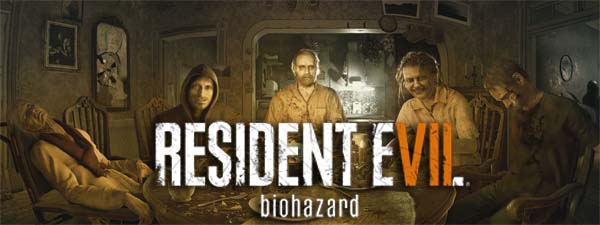
It's been a long time since I've given a crap about Resident Evil. I loved the classic Resident Evil games. The Play Station original is a foundational game for me, and jump-started my interest in horror and the macabre. I felt like the series jumped the shark with Resident Evil 4, however, and my interest in the series tanked with its abandonment of horror in favor of schlockey action-shooter gameplay. I played through Resident Evil 5's co-op with a friend, but didn't really enjoy myself, and after playing the abysmal demo for RE6, I skipped that one entirely.
So I was genuinely excited by Resident Evil VII: Biohazard. The popularity of first-person horror games, and the phenomenon that was P.T. / Silent Hills (not to mention the success of Resident Evil REmastered on Steam) obviously seems to have kicked Capcom in the butt and reminded them that there is still an audience for genuine horror games - an audience that mainstream gaming has neglected for most of the last decade. I'm not sure if development of REVII started as a response to P.T., or if it was already in the works following the success of games like Amnesia, Outlast, and Alien: Isolation. Either way, it's good to see major publishers embracing the genre again.
The family's new - but familiar - mansion
This new Resident Evil really does go back to the franchise's roots. The early hours of the game actually feel a lot like a combination of the original Resident Evil and Resident Evil 3: Nemesis, but updated with a first-person camera and a lot of modern horror contrivances. Long-time fans of the series will recognize the safe rooms and item-boxes. The classic health status indicator is now part of a watch on the character's wrist that you can see whenever you pull up your inventory. There's a foyer with a balcony. Doors are locked by silly, esoteric puzzle mechanisms that require themed keys, crests or various other stand-ins for keys. There's even a booby-trapped shotgun to tease you at the start of the game. Some of these elements of design feel appropriate, while other ham-fisted call-backs admittedly feel like the developers were trying too hard.
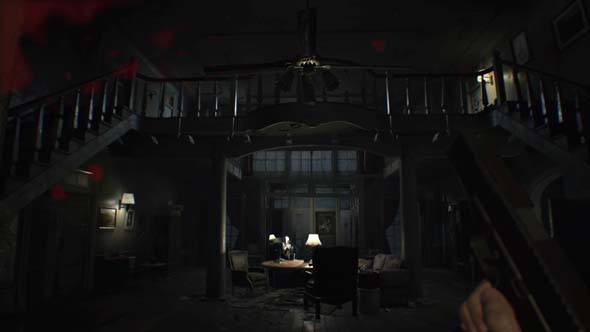
The mansion is new, but has many call-backs to the first game.
The map is well-designed, with its claustrophobic hallways, shortcuts, and lots of visual detail. Lighting is excellent, though the game is a bit too dark at the recommended brightness level (at least without a flashlight), and it becomes washed-out at higher brightness settings. Sound design is also quite exceptional, with the game giving great audio feedback (especially for the pursing stalkers). I also like a lot of the little details, particularly how using a key to unlock a door takes a small amount of time, during which you are vulnerable.
The family also makes for some excellent antagonists, especially compared to the likes of stupid, campy villains like Albert Wesker and Salazar. These villains have a lot of character, and there's enough detail in the mansion to give a sense of who these people might have been before they went off the deep end: the collectible football bobbleheads, for example. And on top of that, they are genuinely disturbing and threatening, and the whole game would probably be scary enough if you just spent the whole time avoiding them and trying to escape their murder house.
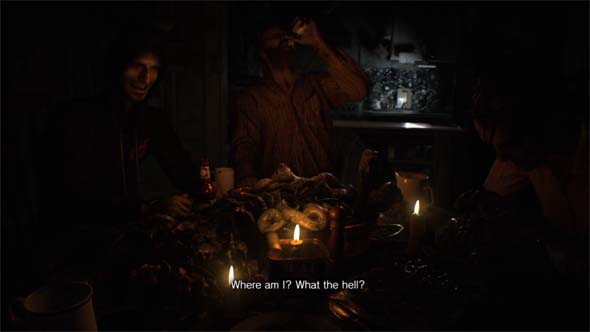
The family makes for genuinely disturbing villains that put RE's earlier villains to shame.
The save system is kind of an odd hybrid of the classic save system and more modern checkpoint systems. The logistics of the classic system have been scaled back, as you no longer require a consumable item (ink ribbon) to manually save (at least not on the default difficulty). But the game will also checkpoint you at certain points, and it maintains a single autosave slot with your checkpointed progress. So if you die to one of the obnoxiously-hard bosses, you don't have to go back a whole hour to your last manual save; instead, you get to restart at the most recent checkpoint.
However, the manual saves still have value, because Biohazard is structurally very similar to the original Resident Evil - both superficially and in terms of gameplay... [More]
a4e07563-fcc1-4e63-88fa-f5d8f517792b|1|5.0
Tags:Resident Evil, Biohazard, Resident Evil 7: Biohazard, Capcom, horror, survival horror, shooter, first person, inventory, resource management, mansion, autosave, save system, puzzle, logistics
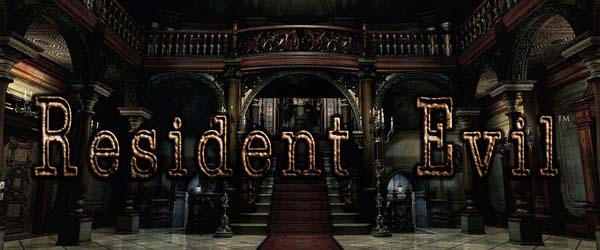
Not having a GameCube meant that I unfortunately missed out on some pretty high-quality games. Probably the most notable ones were Eternal Darkness and the remake of Resident Evil, neither of which, by itself, was enough to sell me on a console. I've since been able to play through a friend's copy of Eternal Darkness, and I had started on Resident Evil, but never got around to finishing it. When the HD remaster showed up on PSN, I was hesitant to buy it, since I knew that I could just play it on my friend's GameCube eventually.
Best of both worlds at the tip of your thumb
However, something in the previews really intrigued me. And that was the compromise that Capcom found for the never-ending conflict between the tank-style controls of the original PSX game and the analog control of newer games. Since I grew up with Resident Evil, Silent Hill, and other survival horror and similar adventure games, I've never had a problem with tank controls. They tend to be the lesser evil when dealing with static camera angles that change unpredictably (as in Resident Evil), and they are perfectly serviceable for behind-the-back or overhead cameras (as in the outdoor areas of Silent Hill). This ensures that the controls remain consistent during camera angle changes, since they are always relevant to the character rather than the camera.
But apparently, some people hate that control paradigm. They criticize it for making the characters feel too slow and lumbering, and that it lacks precision. The controls have oft been cited as one of the reasons for Resident Evil's declining popularity after Resident Evil 2, and supposedly ditching them was a major factor in the "renaissance" that was [supposedly] Resident Evil 4. But let me remind you that Resident Evil 4 had the exact same controls, and the character was just as slow and lumbering (if not moreso). The only difference was that the camera was moved to behind-the-back, and the gameplay switched to an action shooter rather than a more adventure-puzzle kind of game. So really, your problem was never with the controls...
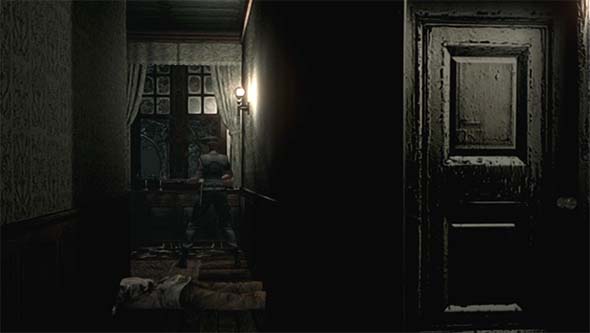
The original Resident Evil was criticized for how its controls and camera lead to frequent blind corners,
wasted ammunition, and cheap kills. The critics were right, but it wasn't game-breaking...
Regardless, analog control has its own baggage train of problems. Pressing the stick in one direction can cause the character to make sudden changes of direction if the camera suddenly changes. This can be mostly avoided by locking the character's movement as long as the player doesn't release or rotate the stick - and the HD Remaster does implement this. But this still leads to sudden turn-arounds when the player needs to move the character around a corner, since you sometimes have to move the stick to the exact opposite direction that you were pressing. And in cases in which the camera angle changes at the point where a change of direction is required to go around a corner or navigate an obstacle (which happens often), then the character can easily get lost in a cycle of spinning around between the two camera zones.
So there is no perfect solution to the problem of static cameras, but I tend to prefer the tank method due to its guarantee of consistency - even at the cost of some slow turning speeds. In any case, advocates of either paradigm should find exactly what they want in this remaster, since both configurations are implemented in the remastered game's default control scheme! Capcom's clever (and elegant) solution was to simply map the tank controls to the directional pad, while leaving the free analog movement on the analog stick. Players are, thus, free to alternate between whichever control they prefer without even having to go into a menu to change it. You can even alternate between them, on the fly, in the heat of the action if the situation warrants it, because I can definitely see how the analog movement could work well in some of the [rare] larger, open areas of the map (particularly for boss fights).
It's OK to hate these red-headed step-zombies
Most of the changes introduced in the GameCube remake serve to add further challenge. The most prominent display of this is the new "Crimson Head" zombie mechanic. If you kill a zombie and didn't manage to get lucky enough to blow its head off, you must burn its body in order to prevent it from resurrecting later in the game as a more dangerous "Crimson Head". These red-headed zombies are faster and more damaging than their precursor form. They can rapidly run across a room and grab you before you even realize they are there. They are also very well-tutorialized, since most players will probably encounter their first Crimson Head while attempting to retrieve the Armor Key from the hallway trapped with suits of armor on rails. The previous hallway includes a dead body that (if you didn't go out of your way to burn previously) will resurrect at this time. This hall has a system of mirrors in place that allow a tremendous degree of visibility from virtually every camera angle, meaning that whichever door you enter from, you'll have an opportunity to see the Crimson Head coming after you. It's a frantic and frightening moment!
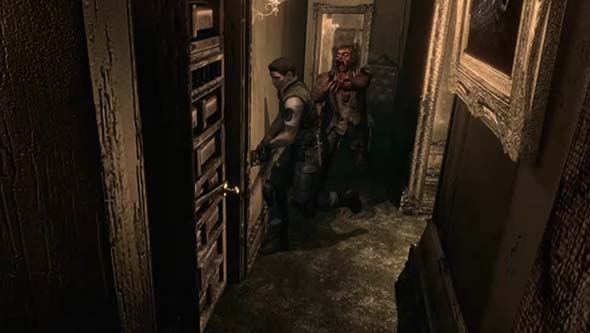
Bodies that you don't burn will resurrect as faster, more deadly "Crimson Heads"
that are difficult to avoid and require a second investment in resources to defeat.
Almost any zombie in the game can potentially turn into this more dangerous form. Destroying their head with a lucky shot or burning their bodies are the only ways to permanently ensure that they can't attack you... [More]
bedbfed9-e92f-45b6-b083-1b57db8977fc|1|5.0
Tags:Resident Evil, HD, remaster, remake, port, Capcom, survival horror, Jill Valentine, Chris Redfield, Albert Wesker, mansion, zombie, save, save system, tank controls, checkpoint, typewriter, ink ribbon, resource management, puzzle, logistics, GameCube, b-movie, Shinji Mikami
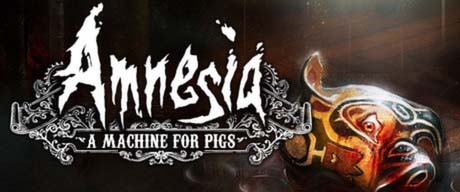
Is Frictional Games working on a new IP? I'm a bit curious as to why they outsourced development of the aptly-named A Machine for Pigs to the third-party developer The Chinese Room. Frictional's staff did stay on as "producers" for this game, so I'm sure that the final product is still consistent with what Frictional would have wanted if they had developed it themselves, and I think the overall story was still written by people at Frictional (but I could be wrong on that account). In any case, the change in development team has certainly had a dramatic effect on the way that the new game plays. The very core gameplay of exploring a linear dungeon with a flashlight is retained, but all the mechanics and the underlying feel of the game are completely different than its predecessor. This isn't necessarily a bad thing, as Amnesia: the Dark Descent wasn't perfect.
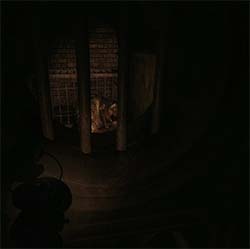
Once again, the underlying premise that sets up Amnesia: a Machine for Pigs is that your character wakes up in a mansion with no memory of who he is or why he is there. Your early exploration of the mansion reveals some vague threat, and you are forced to descend into a deep dungeon in order to discover who you are and resolve the threat. Along the way, you'll encounter deformed creatures and collect notes and documents from your former self explaining the situation, as well as have the occasional hallucinatory flashback as your memory slowly returns. But if you're worried that this sounds too much like the previous game, then fear not: A Machine for Pigs takes an entirely different approach to the gameplay and has a totally different feel to the entire experience. [More]
d070d945-e6da-4541-a97f-8240050b5cc7|1|4.0
Tags:Amnesia: a Machine for Pigs, Amnesia: the Dark Descent, review, the Chinese Room, Frictional Games, Steam, Victorian, England, industrial, survival, horror, survival horror, mansion, amnesia, Battle of the Somme, Silent Hill, Silent Hill Shattered Memories, Resident Evil, checkpoint, indie gaming
|

| 12 | | | | | | | 60 | | 11 | | | | | | | 55 | | 10 | | | | | | | 50 | | 09 | | | | | | | 45 | | 08 | | | | | | | 40 | | 07 | | | | | | | 35 | | 06 | | | | | | | 30 | | 05 | | | | | | | 25 | | 04 | | | | | | | 20 | | 03 | | | | | | | 15 | | 02 | | | | | | | 10 | | 01 | | | | | | | 05 |
|